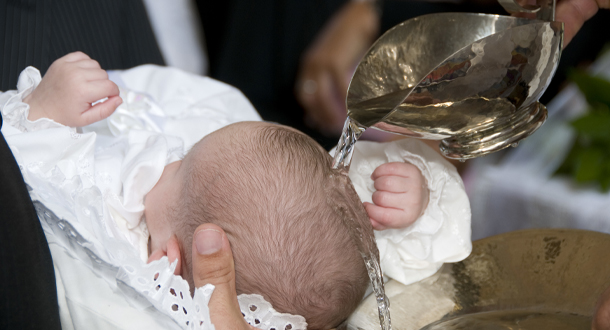
Scripture:
Reflection:
I sometimes imagine the day of my baptism in a little frame church in Louisville’s South End, a working-class neighborhood. A grainy black and white brownie camera photo on the front lawn of our small cracker box home a few black from the church shows my grandmother and uncle smiling at the camera while holding me, a tiny 7-day-old. It was a late May day, one of the most beautiful times of the year in Kentucky.
I was born into a line of Catholics dating back centuries. This, I can only assume, was all in God’s plan. As I matured, I would be nurtured in this faith community for years without fully realizing how counter cultural it is.
In today’s Gospel, we get a glimpse of how God broke into human history to upend evil at every turn. In a familiar, brief story, Jesus is baptized by his kinsman, John the Baptist. Okay, so his life is launched like mine was…the initiation ritual gets done, the voice of God confirms Jesus is on the right track and the Gospel moves on.
But if we pause and read between the lines of the first chapter of the shortest Gospel, we discover the depth of Mark’s understanding of Jesus’, and John’s, roles in the history of God’s work in the world.
First, John was an outlier in the tradition of one of the all-time great outliers, Elijah. He lived in the outskirts of the center of power, Jerusalem, dressed and ate like a madman and spoke radical ideas about conversion.
Second, Jesus, too, was an outlier, being from No-where-ville Nazareth in the northern section of the country, Galilee, cut off from Jerusalem and areas where the action was. The place was a backwater, distained by Jews in the south.
These two men of God begin their vocations outside the mainstream of life, away from centers of influence and trendsetting, away from privilege and power.
The baptism of Jesus by John is confirmation of John’s weird actions, but more importantly, it is an authentic act of repentance, conversion. Jesus is liberated from the dominant values, structures and expectations of the Jewish community in Palestine in the First Century.
The scripture scholar Herman Waetjen describes this baptism in social terms, not merely as a personal transformation:
It is a genuine act of repentance. As such it ends his participation in the structures and values of society. It concludes his involvement in the moral order into which he was born…The entire redemption process of Jewish society as it is maintained by the institutions through which power is ordered…the totality of the Jewish-Roman social construction of reality has been terminated. All the debts that have been incurred under this elitist ordering of power and its community life have been cancelled. The death experience of repentance has redeemed Jesus from his comprehensive indebtedness and the prescribed ways and means of discharging his obligations. He has become wholly unobliged.
As baptized members of the Body of Christ, we, too, are unobliged to conform to the social sins of our post-modern, militaristic, capitalist society that leaves our environment in shambles and billions of our brothers and sisters in poverty. We, too, are now the outliers, pointing to a new creation in which we respect and love one another, protect our planet earth, and as good stewards of our possessions and wealth, share all we have with the most needy and vulnerable.
I am no longer a sweet little infant being held by my loving grandmother at that long-gone frame church. I am, by God’s grace, a mature disciple of Jesus challenging the sin within me and in the difficult world around me.
Let us pray for the insight to know what God wants of each of us at this moment in history using the talents, gifts and abilities to build the reign of God here and now.
Jim Wayne is a board member of the Passionist Solidarity Network (PSN), and author of The Unfinished Man. He lives in Louisville, Kentucky.
